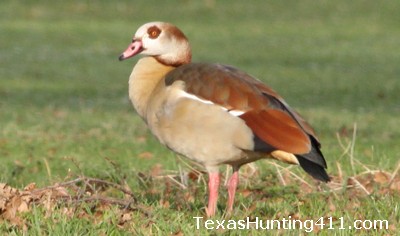People have more options that ever now days. The same can be said of goose hunters. Specifically, regarding Egyptian goose hunting. “Say what,” you say? It seems like everyone and everything that was not born here in Texas is trying to get here as fast as it can. The Egyptian goose is no different, but this non-native waterfowl may not get the warm welcome that it’s looking for. This largely terrestrial species is highly territorial when it comes to breeding, but Egyptian geese seem to coexist with native duck species just fine in the areas where they are both found.
The Egyptian goose is native to inland tropical regions of sub-Saharan Africa where it can be found along rivers, marshes, lakes and similar wetlands, though it is absent from the central western coast of the continent and the densest forest regions. These waterfowl do not migrate, but can be nomadic in drier regions as they follow the best food sources throughout the year.

More about Egyptian Geese in Texas
Source: “Egyptian geese are not native to Texas or anywhere else in North America, but you’ve probably seen them at park ponds or golf course water holes.
The birds look like a cross between a duck and a goose with broad, round, chestnut-colored patches around yellow eyes that make them look as though they’re wearing the latest fashion in sunglasses. The dapper birds sport gray-tan to ruddy-brown backs, black tails and pink beaks, legs and feet.
With more than a 2-foot body length and a wingspan of nearly 58 inches, the birds are hard to overlook. A big white wing patch gives them an even more arresting appearance, particularly in flight.
Egyptian geese have been imported from their native home in Africa south of the Sahara as decorative birds. Those that have escaped private ponds or aviaries have established hardy feral populations that seem to be growing in numbers. Just look at golf courses or city parks, which held only a handful of the birds a few years ago but now may host crowds of the Egyptian geese.”